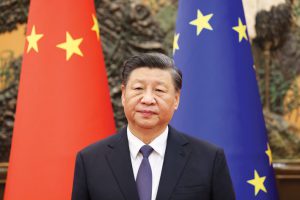BLOOMBERG
Xi Jinping started an unprecedented third term as China’s president with fresh vows to ensure stability and strengthen party leadership, as he faces a future of slower growth and greater confrontation with the US.
“Security is the foundation for development, and stability is the precondition for prosperity,†Xi said on Monday to close out the annual National People’s Congress (NPC). He vowed to oppose foreign interference on Taiwan, a veiled reference to increasing American support for the democratically elected government in Taipei.
The remarks cap a yearlong reshuffle that has demonstrated Xi’s dominance over the nation of 1.4 billion people, overhauling the government and placing allies in key positions. The NPC has voted unanimously to give Xi another five-year term, after abolishing constitutional provisions in 2018 that would’ve prevented him from staying on.
Xi’s one-time personal secretary, Li Qiang, held his first annual news briefing since being installed as premier and the Communist Party’s No. 2 official. Li used that event to repeatedly stress the government’s commitment to developing the non-state sector and endorsing the positive role played by private entrepreneurs in the economy.
Xi has used the annual parliamentary gathering to hit back at the US for trying to prevent the country’s rise. Last week, he called on the private sector to help overcome “comprehensive containment and suppression by Western countries led by the US†— rare direct criticism of the US by Xi — while his foreign minister warned of the risk of “conflict and confrontation.â€
Besides deepening ties with Taiwan and supporting its military, the US is increasingly using export controls, sanctions and other punitive measures to prevent China from obtaining technology that could give it an economic and military advantage, particularly in semiconductors and artificial intelligence. The Biden administration is working to tighten even further its restrictions on the export of chip manufacturing gear to China, Bloomberg News reported.
Over his decade in power, Xi has placed greater emphasis on security issues — both domestic and foreign — than his predecessors. When he delivered a report to a party congress in October, Xi mentioned “security†91 times. “Economy†appeared just 60 times — the first time it was eclipsed by security issues in the important policy statement since the party took power in 1949.
The party is facing greater challenges at home in the coming years, from slowing growth to lingering dissatisfaction with the strict enforcement — and sudden abandonment — of Xi’s signature Covid Zero policy. Mass protests against virus curbs in November represented a rare challenge to the party’s authority, with participants in at least one gathering in Shanghai calling for Xi to step down.
Premier Li urges US-China cooperation, seeks ‘concrete actions’
New Premier Li Qiang called for China and the US to cooperate better, potentially opening the door for the nations to find a way past their recent tensions.
“I want to stress that it is important for us to translate the important consensus reached between President Xi Jinping and President Biden during the meeting last November into actual policies and concrete actions,†Li said.
The comments suggest a new willingness by China to resume talks with the US since the alleged spy balloon incident roiled ties between the world’s biggest economies.
 The Gulf Time Newspaper One of the finest business newspapers in the UAE brought to you by our professional writers and editors.
The Gulf Time Newspaper One of the finest business newspapers in the UAE brought to you by our professional writers and editors.
